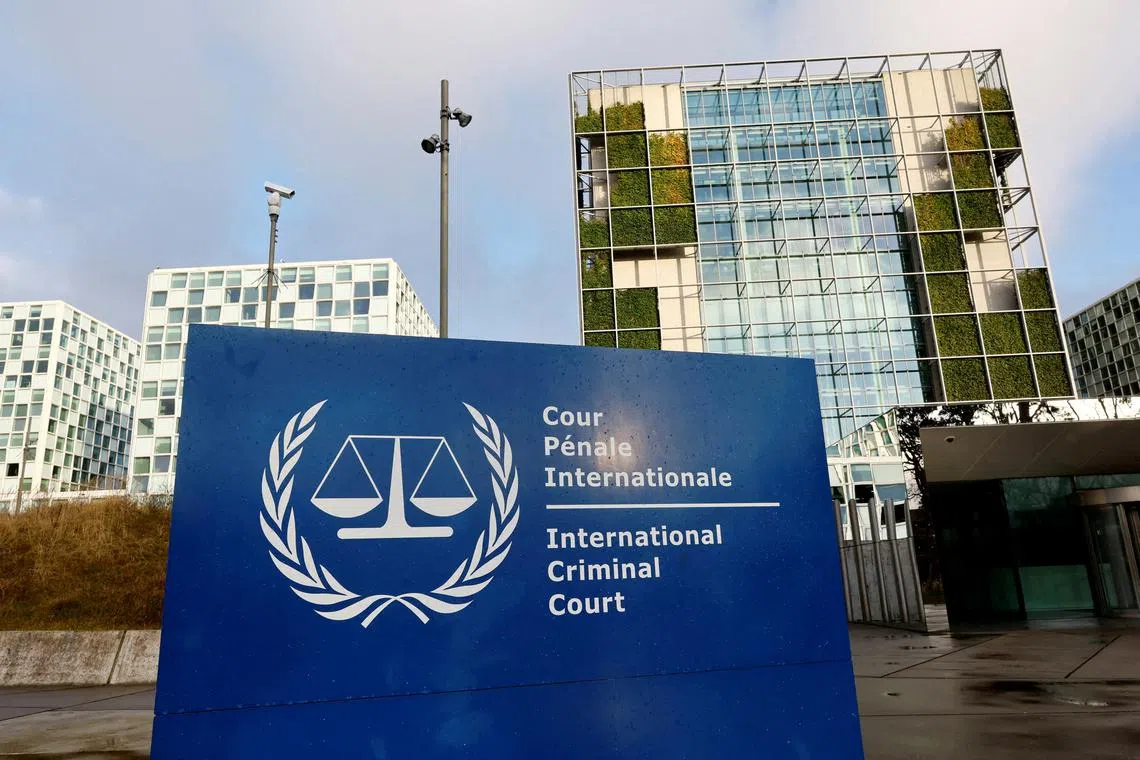Trump administration imposes new sanctions on four ICC judges, prosecutors
Sign up now: Get ST's newsletters delivered to your inbox

Two judges and two prosecutors of the International Criminal Court have been hit with US sanctions.
PHOTO: REUTERS
- The US sanctioned ICC Judge Nicolas Guillou (France) for presiding over a case against Israeli PM Netanyahu, alleging war crimes in Gaza.
- A Canadian judge and two deputy prosecutors were also sanctioned for supporting ICC actions against Israel, deemed an attack on judicial independence.
- Netanyahu praised the US action, while the ICC criticised it as a "flagrant attack". US, Russia and Israel reject the ICC.
AI generated
WASHINGTON – US President Donald Trump’s administration on Aug 20 imposed sanctions on two judges and two prosecutors at the International Criminal Court (ICC), as Washington ramped up its pressure on the war tribunal over its targeting of Israeli leaders and a past decision to investigate US officials.
In a statement, US Secretary of State Marco Rubio called the court “a national security threat that has been an instrument for lawfare” against the US and Israel.
The move drew ire from France and the United Nations.
Paris urged Washington to withdraw the sanctions, while the ICC said it deplored the designations, calling them “a flagrant attack” against the independence of an impartial judicial institution.
Washington designated for sanctions Judge Nicolas Yann Guillou of France, Mr Nazhat Shameem Khan of Fiji, Mr Mame Mandiaye Niang of Senegal, and Judge Kimberly Prost of Canada, according to the US Treasury and State Department. All the officials have been involved in cases linked to Israel and the US.
“The US has been clear and steadfast in our opposition to the ICC’s politicisation, abuse of power, disregard for our national sovereignty and illegitimate judicial overreach,” Mr Rubio said.
“I urge countries that still support the ICC, many of whose freedom was purchased at the price of great American sacrifices, to resist the claims of this bankrupt institution.”
The second round of sanctions comes barely three months after Washington took the unprecedented step of slapping sanctions on four other ICC judges.
The escalation will most likely impede the functioning of the court and the prosecutor’s office as they deal with major cases, including war crime allegations against Russia over its invasion of Ukraine
ICC judges issued arrest warrants for Israeli Prime Minister Benjamin Netanyahu, former Israeli defence chief Yoav Gallant and Hamas leader Ibrahim al-Masri in November 2024 for alleged war crimes and crimes against humanity during the Gaza conflict.
In March 2020, prosecutors opened an investigation in Afghanistan that included looking into possible crimes by US troops, but, since 2021, it has deprioritised the role of the US and focused on alleged crimes committed by the Afghan government and the Taliban forces.
The ICC, which was established in 2002, has international jurisdiction to prosecute genocide, crimes against humanity and war crimes in its 125 member states or if a situation is referred by the UN Security Council. Some nations, including the US, China, Russia and Israel, do not recognise the court’s authority.
It has high-profile war crimes investigations under way into the Israel-Hamas conflict, as well as in Sudan, Myanmar, the Philippines and Venezuela.
Undermining international justice
Both France and the UN said the judges’ work is crucial for international justice.
“Their role is essential in the fight against impunity,” a statement from the French Foreign Ministry said.
UN spokesman Stephane Dujarric said the US sanctions undermine the foundation of international justice. He added: “The (US) decision imposes severe impediments on the functioning of the office of the prosecutor.”
Mr Netanyahu’s office issued a statement welcoming the US sanctions.
The designations freeze any US assets the individuals may have and essentially cut them off from the US financial system.
Judge Guillou presided over a pre-trial panel that issued the arrest warrant for Mr Netanyahu. Mr Khan and Mr Niang are the court’s two deputy prosecutors.
Judge Prost served on an ICC appeals chamber that, in March 2020, unanimously authorised the ICC prosecutor to investigate alleged war crimes and crimes against humanity committed in Afghanistan since 2003, including examining the role of US service members.
The Trump administration’s dislike of the court goes back to Mr Trump’s first term. In 2020, Washington imposed sanctions on then prosecutor Fatou Bensouda and one of her top aides over the court’s work on Afghanistan.
Countering Mr Rubio’s call to other countries to oppose the ICC, the court urged member states to stand in solidarity. “The court calls upon states parties and all those who share the values of humanity and the rule of law to provide firm and consistent support to the court and its work carried out in the sole interest of victims of international crimes,” it said. REUTERS


